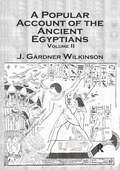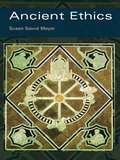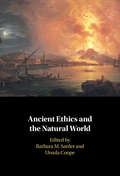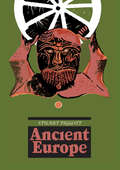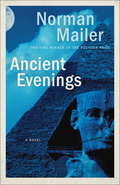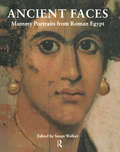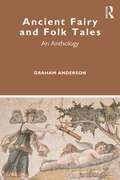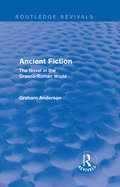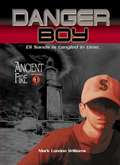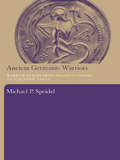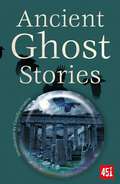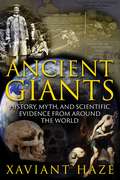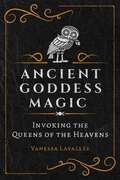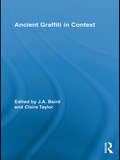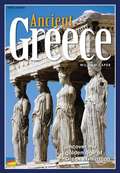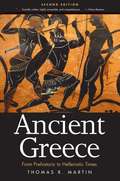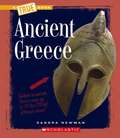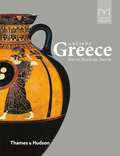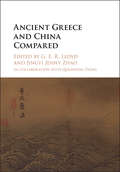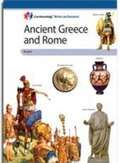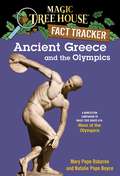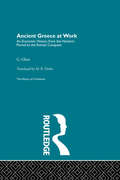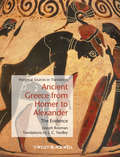- Table View
- List View
Ancient Egyptians: Revised And Abridged From His Larger Work (classic Reprint) (African Heritage Classical Research Studies)
by J. Gardner WilkinsonWritten in 1836, this two-volume study has enduring importance in the field of Egyptology. Covering topics including Egyptian homes, ceremonies, hunting, religious rites, and castes, it provides a comprehensive account of ancient Egyptian life and practices. The work is illustrated with numerous anecdotes and hundreds of beautiful woodcuts.
Ancient Ethics
by Susan Sauvé MeyerThis is the first comprehensive guide and only substantial undergraduate level introduction to ancient Greek and Roman ethics.It covers the ethical theories and positions of all the major philosophers (including Socrates, Plato and Aristotle) and schools (Stoics and Epicureans) from the earliest times to the Hellenistic philosophers, analyzing their main arguments and assessing their legacy. This book maps the foundations of this key area, which is crucial knowledge across the disciplines and essential for a wide range of readers.
Ancient Ethics and the Natural World
by Barbara M. Sattler Ursula CoopeThis book explores a distinctive feature of ancient philosophy: the close relation between ancient ethics and the study of the natural world. Human beings are in some sense part of the natural world, and they live their lives within a larger cosmos, but their actions are governed by norms whose relation to the natural world is up for debate. The essays in this volume, written by leading specialists in ancient philosophy, discuss how these facts about our relation to the world bear both upon ancient accounts of human goodness and also upon ancient accounts of the natural world itself. The volume includes discussion not only of Plato and Aristotle, but also of earlier and later thinkers, with an essay on the Presocratics and two essays that discuss later Epicurean, Stoic, and Neoplatonist philosophers.
Ancient Europe
by Stuart PiggottThis book interprets the main lines of European prehistory from the first agricultural communities in the sixth or even seventh millennium B.C. until the incorporation of much of barbarian Europe within the Roman Empire. It traces the beginnings of animal domestication and plant cultivation in ancient Western Asia, and the transmission of these skills by movements of peoples or by assimilation, in the European continent. The early technology of working in copper, and later in bronze, is discussed. Metal winning and working, and trade in raw materials and finished products, brought social and political repercussions to barbarian and civilised peoples alike.The spread of the Indo-European languages is considered in its archaeological context, as is the formation of the Celtic peoples, soon to acquire iron technology and to become the main barbarian component in Europe, side-by-side with the civilised Mediterranean societies, Greek, Etruscan or Roman. The later Celtic world of Europe and the British Isles is examined, and an attempt made to estimate the contribution of the older barbarian world to the Europe, which emerged from the ruins of the Roman Empire, geographically, the book ranges over the whole European field, from the Atlantic shores to the Urals and the Caucasus. While it does not pretend to be a prehistory of Europe within the period chosen, the book does bring together and discuss for the first time much scattered and often little-known archaeological evidence.This book is organized in a manner that will permit it being read on two levels. For the general non-specialist reader, the text and illustrations should give a sufficient idea of the nature of the theme and of the evidence, and of the development of the barbarian cultures side-by-side with the civilizations of antiquity, as their precursors and their subsequent counterparts. For the archaeological student however the text is documented with rather full references and notes at the end of each chapte
Ancient Evenings
by Norman MailerNorman Mailer's dazzlingly rich, deeply evocative novel of ancient Egypt breathes life into the figures of a lost era: the eighteenth-dynasty Pharaoh Rameses and his wife, Queen Nefertiti; Menenhetet, their creature, lover, and victim; and the gods and mortals that surround them in intimate and telepathic communion. Mailer's reincarnated protagonist is carried through the exquisite gardens of the royal harem, along the majestic flow of the Nile, and into the terrifying clash of battle. An extraordinary work of inventiveness, Ancient Evenings lives on in the mind long after the last page has been turned.
Ancient Faces: Mummy Portraits in Roman Egypt (A\catalogue Of Roman Portraits In The British Museum Ser. #Pt. 4)
by Susan WalkerFrom the first major discoveries a century ago, the painted portraits of Roman Egypt were a revelation to scholars and the public alike, and the recent finding of a new cache of these gilded images, which made national headlines, have only heightened their mystery and appeal. Published to coincide with a new major exhibition of these portraits, Ancient Faces is the most comprehensive, up-to-date survey of these astonishing works of art.Dating from the later period of Roman rule in Egypt, shortly before the birth of Christ, the painted mummy portraits are among the most remarkable products of the ancient world, a fusion of the traditions of pharonic Egypt and the Classical world. They are historical and cultural objects of outstanding importance and beauty, superb works of art that represent some of the earliest known examples of life-like portraiture. Though the subjects of the portraits believed in the traditional Egyptian cults, which offered them a firm prospect of life after death, they also wished to be commemorated in the Roman manner, with their fashion of dress and adornment signaling their status in life. Despite their ancient history, these portraits speak to the modern eye with a beauty and intensity that would be lost to portraiture until the Renaissance.
Ancient Fairy and Folk Tales: An Anthology
by Graham AndersonThis anthology explores the multitude of evidence for recognisable fairy tales drawn from sources in the much older cultures of the ancient world, appearing much earlier than the 17th century where awareness of most fairy tales tends to begin. It presents versions of Cinderella, The Emperor’s New Clothes, Snow White, The Frog Prince and a host of others where the similarities to familiar ‘modern’ versions far outweigh the differences. Here we find Cinderella as a courtesan, Snow White coming to a tragic end or an innocent heroine murdering her sisters. We find an emperor’s new clothes where the flatterers compare him to Alexander the Great, or a pair of adulterers caught in a magic trap. Tantalising fragments suggest that there is more to be discovered: we can point to a Sleeping Beauty where the girl takes on the green colouring of the surrounding wood, or we encounter a Rumpelstiltskin connected to a mystery cult. The overall picture suggests a much richer texture of popular tale as a fascinating new legacy of antiquity. This volume breaks down the traditional barriers between Classical Mythology and the fairy tale, and will be an invaluable resource for anyone working on the history of fairy tales and folklore.
Ancient Fiction: The Novel in the Graeco-Roman World (Routledge Revivals)
by Graham AndersonA number of ancient novelists were skilful storytellers and resourceful literary artists, and their works are often carefully individualised presentations of an ancient and distinguished heritage. Ancient Fiction, first published in 1984, examines the tales retold by these novelists in light of more recently discovered Near Eastern texts, and in this way offers a tentative solution to Rohde’s celebrated problem about the origins of the Greek novel. Among the surprises that emerge are an ancient stratum of the Arabian Nights and a possible Tristan-Romance, as well as an animal Satyricon and a human Golden Ass. This new framework is, however, incidental to an examination of the achievements of ancient novelists in their own right. In presenting character, structuring narrative, imposing a veneer of sophistication or contriving a religious ethos, these writers demonstrate that their work is worthy of sympathetic study, rather dismissal as the pulp fiction of the ancient world.
Ancient Fire (Danger Boy #1)
by Mark London WilliamsHitch a ride through time on the Danger Boy adventures! These rich, action-filled fantasies about a reluctant time-traveler and his unusual sidekicks will keep readers on the edge of their seats. The year is 2019, and a secret government agency is forcing Eli's dad to continue with his time-travel experiments, even though Eli's mom has just disappeared in one. Now Eli has a ridiculous new code name -- and a gravely important mission. In DANGER BOY: ANCIENT FIRE, a lab accident sends Eli sprawling through the Fifth Dimension, where he hooks up with the amiable Clyne, an evolved dinosaur from an alternate Earth who just wants to finish his homework. Clyne's timeship lands them in ancient Alexandria, Egypt, just as a great fire rages through the city and the girl scientist Thea is fleeing an angry mob who thinks she's a witch. As if that's not enough, in the present-day world, a deadly pox is on the loose, and bizarre things are starting to happen to the fabric of time itself.
Ancient Germanic Warriors: Warrior Styles from Trajan's Column to Icelandic Sagas
by Michael P. SpeidelPresenting a range of evidence for these diverse styles, from Roman art to early medieval bracteate amulets, and from classical texts to Beowulf, the Edda and Icelandic sagas, Professor Speidel here details seventeen different Germanic warriors styles, including berserks, wolf-warriors, club-wielders, long-hairs, ghost warriors and horse-stabbers, and how they indicate an unbroken continuity of customs, beliefs and battle-field tactics. Ancient Germanic warriors played a decisive role in historical events from 200 BC, when Germanic culture first became identifiable, to AD 1000 when Christianity swept through the Nordic countries. Arising from beliefs and states of mind, a variety of warrior styles manifested themselves in differences of dress, weaponry and fighting technique. Fully illustrated with over fifty photographs, this vivid and fascinating survey adds a colourful new dimension to our understanding of the history of Europe.
Ancient Ghost Stories (Ghost Stories)
by Flame TreeGhosts and apparitions abound across the peoples of the early civilisations, from the Ancient Egyptians, the Babylonians, Greeks, Romans and the Vikings too.Phantoms of the dead, warning apparitions and necromancy – there are many stories of ghosts to be found in the retold literature of ancient peoples: &‘Khonsemhab and the Ghost&’ and &‘The Adventure of Setne Khamwas with the Mummies&’, both from Ancient Egypt; &‘Philinnion and Machates&’ from Ancient Rome; spirits featured in Homer&’s Odyssey, from Ancient Greece; tales of Babylonian demons and the netherworld; and stories of fire apparitions from Japan. The Vikings too had their fair share of ghosts, such as crop up in the 13th-century Icelandic Laxdaela Saga. These stories are all brought together in this new collection for an intriguing insight into the spirit world of early cultures.FLAME TREE 451: From myth to mystery, the supernatural to horror, fantasy and science fiction, Flame Tree 451 offers a healthy diet of werewolves and mechanical men, blood-lusty vampires, dastardly villains, mad scientists, secret worlds, lost civilizations and escapist fantasies. Discover a storehouse of tales gathered specifically for the reader of the fantastic.
Ancient Giants: History, Myth, and Scientific Evidence from around the World (Discovering Ancient America Ser.)
by Xaviant HazeInvestigates physical evidence, history, and myths to reveal the lost race of giants that once dominated the world • Reveals suppressed archaeological and scientific discoveries supporting the existence of a worldwide race of giants • Examines giant myths and legends from ancient religious texts and literature from around the world • Includes findings from throughout Europe (Britain, France, Spain, Italy, Germany, and Russia), the Middle East (Israel, Egypt, Syria, Iraq, and Iran), Africa, Australia, New Zealand, and the Far East (China, Japan, Malaysia, and the Philippines) From the Nephilim and Goliath in the Bible to the Titans in Greek mythology and the Fomorians and Frost Giants in Celtic and Nordic lore, almost every culture around the world has spoken of an ancient race of giants. Giant footprints left in the geological bedrock, tens of thousands of years old, have been discovered in India, China, and the war-torn lands of Syria. Giant bones and full skeletons have been found in Europe, the Middle East, Africa, Australia, and Asia. Yet despite mounting evidence, mainstream science continues to consign these findings to the fringe. Examining global myths, historical records, megalithic ruins, and archaeological findings, Xaviant Haze provides compelling evidence for a lost race of giants in Earth’s prehistory. He explores myths that go back thousands of years, including those found in the world’s holiest scriptures, as well as medieval and modern myths, such as Geoffrey of Monmouth’s account of the first kings of Britain and the stories of giant bones unearthed by Allied soldiers during World War II. He investigates historical reports of ancient giants found in Ireland and the British Isles—the remains of which mysteriously disappeared shortly after their discovery. He explores the legends of giants in Russia and goes deep into the Far East, revealing the multitude of fascinating giant legends in China. Haze explains how giants were responsible for the megalithic wonders of Malta and how the early settlers of Australia discovered the remains of giants but these findings were suppressed by the Royal Academies. He also explores the mythic origins of the giants: Were they the hybrid results from genetic experiments of ancient aliens or from the interbreeding of the fallen angels with the daughters of man? Covering legends and finds from throughout Europe, the Middle East, Africa, Australia, New Zealand, and the Far East, Haze also presents--in its entirety--The Book of Giants, a portion of the Dead Sea Scrolls suppressed due to its overwhelming support for the existence of giants in antiquity.
Ancient Goddess Magic: Invoking the Queens of the Heavens
by Vanessa Lavallée• Explores beliefs and myths from Mesopotamia, ancient Egypt, and around the Mediterranean, revealing how ancient goddesses were powerful Queens of the Heavens and Guardians of the Underworld, not passive fertility symbols• Looks at creator goddesses, sun goddesses, lunar goddesses, warrior maiden goddesses, and night goddesses, including Hathor, Asherah, Inanna, Hekate, Athena, Astarte, and Gula-Bau• Includes modern adaptations of ancient goddess magic rituals and instructions for creating divine amulets, figurines, and stones blessed with the goddesses&’ powersIn the most ancient cultures of our world, goddesses were seen not as passive fertility symbols but as powerful, active queens of the heavens who protected cities, guided the dead and dying, and oversaw all forms of rebirth and transformation. Sharing her years of research and personal exploration, Vanessa Lavallée presents the animistic beliefs of our long-forgotten ancestors and shows how the queens of the heavens still have a vital role to play in modern spirituality.Lavallée looks at sun goddesses who were often viewed as the mothers of the gods and reveals how to spiritually and magically work with creatrix energies. Examining how to work with the warrior goddess archetype found in goddesses such as Athena, Circe the sorceress, and Aphaia from the island of Aegina, the author explains their important connections to the Eagle constellation and eagle lore. Looking at night goddesses, including Gula-Bau, Ataegina, and Hecate, Lavallée explores their star magic and healing powers and describes their connection to death and the underworld as well as to Sirius, the Milky Way, and Vega, the goat star. Exploring lunar goddesses and their role as protectors and their connections to the swan and the Cygnus constellation, she looks at how to work with ladies of the sea such as Astarte, Aphrodite, and Tanit.Offering modern adaptations of ancient goddess magic rituals, Lavallée explains how to perform rituals for healing, protection, and purification and how to create divine amulets and figurines blessed with the goddesses&’ powers. She also reveals how to practice astral bathing for spiritual guidance and presents initiation practices throughout to help you connect with each queen of the heavens.
Ancient Graffiti in Context (Routledge Studies in Ancient History)
by J. A. BairdGraffiti are ubiquitous within the ancient world, but remain underexploited as a form of archaeological or historical evidence. They include a great variety of texts and images written or drawn inside and outside buildings, in public and private places, on monuments in the city, on objects used in daily life, and on mountains in the countryside. In each case they can be seen as actively engaging with their environment in a variety of ways. Ancient Graffiti in Context interrogates this cultural phenomenon and by doing so, brings it into the mainstream of ancient history and archaeology. Focusing on different approaches to and interpretations of graffiti from a variety of sites and chronological contexts, Baird and Taylor pose a series of questions not previously asked of this evidence, such as: What are graffiti, and how can we interpret them? In what ways, and with whom, do graffiti communicate? To what extent do graffiti represent or subvert the cultural values of the society in which they occur? By comparing themes across time and space, and viewing graffiti in context, this book provides a series of interpretative strategies for scholars and students of the ancient world. As such it will be essential reading for Classical archaeologists and historians alike.
Ancient Greece
by William Caper Margaret McnamaraLearn about ancient Greek culture and how it helped shape the art, ideas, words, and stories of the modern world. (Set of 6 with Teacher's Guide and Comprehension Question Card)
Ancient Greece
by Robert PayneA history of Greece from its founding to the advent of Philip of Macedon. Covers all aspects of Greek life, philosophy and literature.
Ancient Greece
by Thomas MartinIn this compact yet comprehensive history of ancient Greece, Thomas R. Martin brings alive Greek civilization from its Stone Age roots to the fourth century B.C. Focusing on the development of the Greek city-state and the society, culture, and architecture of Athens in its Golden Age, Martin integrates political, military, social, and cultural history in a book that will appeal to students and general readers alike. Now in its second edition, this classic work now features new maps and illustrations, a new introduction, and updates throughout. â œA limpidly written, highly accessible, and comprehensive history of Greece and its civilizations from prehistory through the collapse of Alexander the Greatâ TMs empire. . . . A highly readable account of ancient Greece, particularly useful as an introductory or review text for the student or the general reader.â ?â "Kirkus Reviews â œA polished and informative work that will be useful for general readers and students.â ?â "Daniel Tompkins, Temple University
Ancient Greece (A true Book: Ancient Civilizations)
by Sandra NewmanA True Book: Ancient Civilizations series allows readers to experience what makes each ancient civilization distinctive and exceptional as well look at its influence on the some of the practices of the modern world. This series includes an age appropriate (grades 3-5) introduction to curriculum-relevant subjects and a robust resource section that encourages independent study.
Ancient Greece (Pocket Museum)
by David SmithA vast collection of significant works of art from the whole of ancient Greek civilization and a range of museums, gathered in one handy, pocket-sized guide <p><p> The numerous treasures of ancient Greece are scattered all over the world, impossible to view in the context of fellow objects, or in some cases impossible to see at all, without visiting institutions across the globe. This magnificently illustrated book presents more than 200 objects currently housed in public collections around the world that offer both context and immediacy to the rich culture of ancient Greece. From the bifacial hand tools of the Lower Palaeolithic to the Hellenistic Great Altar of Pergamon,the artifacts presented here reveal a complex sociocultural history of shifting priorities, spiritual beliefs, and cultural traditions. Objects from across the Greek world, valued in life and in death, reflect the transmission of shared ideals across vast distances through relationships maintained for centuries at a time. <p> Pocket Museum: Ancient Greece also offers an insight into the history of collecting and methods of interpretation, examining how the perception of objects has changed over time. Beautifully illustrated with photographs of each featured artifact, this is an absorbing introduction to a culture that has exerted an unparalleled influence on Western civilization.
Ancient Greece and China Compared
by Jingyi Jenny Zhao Qiaosheng Dong G. E. R. LloydAncient Greece and China Compared is a pioneering, methodologically sophisticated set of studies, bringing together scholars who all share the conviction that the sustained critical comparison and contrast between ancient societies can bring to light significant aspects of each that would be missed by focusing on just one of them. The topics tackled include key issues in philosophy and religion, in art and literature, in mathematics and the life sciences (including gender studies), in agriculture, city planning and institutions. The volume also analyses how to go about the task of comparing, including finding viable comparanda and avoiding the trap of interpreting one culture in terms appropriate only to another. The book is set to provide a model for future collaborative and interdisciplinary work exploring what is common between ancient civilisations, what is distinctive of particular ones, and what may help to account for the latter.
Ancient Greece and Rome
by Core Knowledge FoundationAncient Greece and Rome explores how the cultural and political traditions of ancient Greece and Rome have influenced Western society more profoundly than perhaps any other civilizations in world history.
Ancient Greece and Rome
by Core Knowledge FoundationAncient Greece and Rome explores how the cultural and political traditions of ancient Greece and Rome have influenced Western society more profoundly than perhaps any other civilizations in world history.
Ancient Greece and the Olympics (Magic Tree House Fact Tracker #10)
by Mary Pope Osborne Sal Murdocca Natalie Pope BoyceMagic Tree House Research Guides are now Magic Tree House Fact Trackers! Track the facts with Jack and Annie! When Jack and Annie got back from their adventure in Magic Tree House #16: Hour of the Olympics, they had lots of questions. What did the ancient Greeks wear? What did they do for fun? Where were the very first Olympics held? How are our modern Olympics similar to the ancient Olympics? Find out the answers to these questions and more as Jack and Annie track the facts. Filled with up-to-date information, photos, illustrations, and fun tidbits from Jack and Annie, the Magic Tree House Fact Trackers are the perfect way for kids to find out more about the topics they discovered in their favorite Magic Tree House adventures.From the Trade Paperback edition.
Ancient Greece at Work
by G. GlotzOriginally published between 1920-1970,The History of Civilization was a landmark in early twentieth century publishing. It was published at a formative time within the social sciences, and during a period of decisive historical discovery. The aim of the general editor, C.K. Ogden, was to summarize the most up to date findings and theories of historians, anthropologists, archaeologists and sociologists. This reprinted material is available as a set or in the following groupings: * Prehistory and Historical Ethnography Set of 12: 0-415-15611-4: £800.00 * Greek Civilization Set of 7: 0-415-15612-2: £450.00 * Roman Civilization Set of 6: 0-415-15613-0: £400.00 * Eastern Civilizations Set of 10: 0-415-15614-9: £650.00 * Judaeo-Christian Civilization Set of 4: 0-415-15615-7: £250.00 * European Civilization Set of 11: 0-415-15616-5: £700.00
Ancient Greece from Homer to Alexander: The Evidence (Blackwell Sourcebooks in Ancient History #15)
by Joseph RoismanWith fresh, new translations and extensive introductions and annotations, this sourcebook provides an inclusive and integrated view of Greek history, from Homer to Alexander the Great. New translations of original sources are contextualized by insightful introductions and annotations Includes a range of literary, artistic and material evidence from the Homeric, Archaic and Classical Ages Focuses on important developments as well as specific themes to create an integrated perspective on the period Links the political and social history of the Greeks to their intellectual accomplishments Includes an up-to-date bibliography of seminal scholarship An accompanying website offers additional evidence and explanations, as well as links to useful online resources
